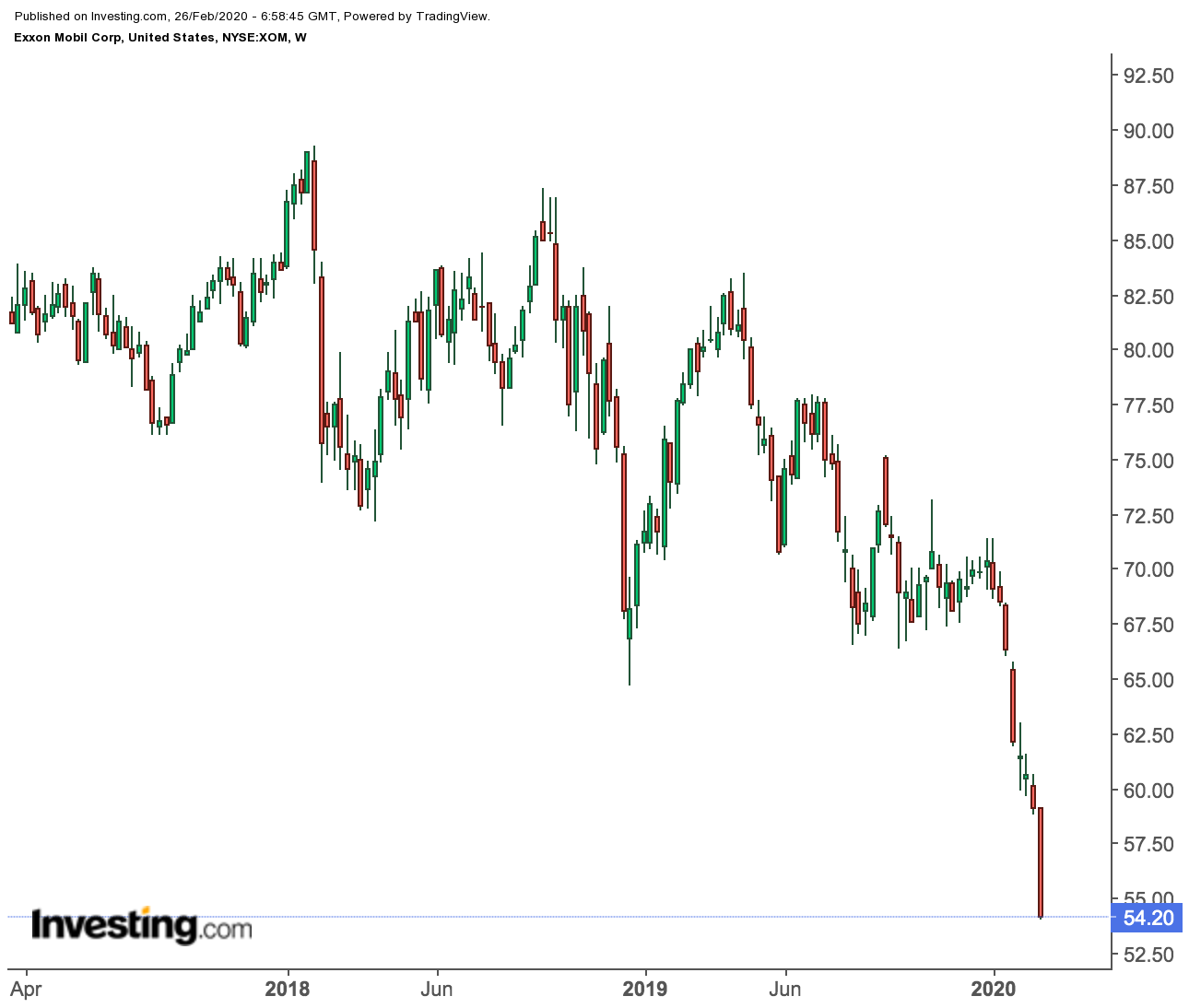Energy giant Exxon Mobil Corp (NYSE:XOM) has plummeted fast in the indiscriminate sell-off that has gripped the market this week. This isn't hugely surprising — the fate of oil stocks is closely tied with the economy, which is under pressure after the outbreak of coronavirus in China, the world’s largest oil importer.
After falling about 8% in the past two days, Exxon Mobil stock has touched the lowest level in 15 years. It fell yesterday to $54.20, extending its 22% decline this year. The last time the Texas-based driller’s stock traded at this level was the end of 2005, when crude fetched $59.
That massive plunge has pushed the dividend yield on Exxon Mobil stock to more than 6%, the most since the mid-1990’s, making it one of the highest yielding blue-chip stocks on the S&P 500.
That kind of return from a AAA rated stock should be very tempting for the long-term income investors whose investing aim is to receive growing dividend income from the companies which are the leaders in their respective industries. Exxon has been a generous dividend payer, hiking its shareholder payout every year for the past 37 years. It currently pays $1.74 a share dividend.
But the company’s recent financial performance is raising concerns about its ability to fund its dividend payments. In the fourth-quarter, Exxon’s cash from operations failed to cover capital expenditures and it was the fifth quarter in a row in which the company relied on asset sales or borrowing to cover its dividend payments.
Uncertain Future
As the future of Big Oil becomes uncertain, some of the world’s largest research firms are becoming more open in advising investors to stay away from oil stocks.
Morgan Stanley said in a recent note that Exxon is "most exposed" to negative headwinds in the industry, including oversupply in oil, natural gas and liquefied natural gas. Goldman Sachs, at the same time, downgraded Exxon to "sell" and slashed its price target to $59 from $72.
"We do not see a compelling case to own XOM relative to other energy stocks with a more attractive returns profile," Goldman analyst Neil Mehta wrote.
One big reason that investors have started to stay away from Exxon stock is the company’s quite radical approach to creating value. At a time when other oil firms are focusing on strengthening their cash positions by avoiding large ticket investments, Exxon is spending big on new initiatives.
Despite bleak oil demand forecasts, Exxon CEO Darren Woods believes the oil and gas industry needs trillions of dollars of fresh investment to meet global demand for energy products by 2040. With this in mind, Exxon is investing in low-cost mega-projects that will help maintain the company's dominance in oil and natural gas markets for decades.
That approach, though not investor friendly, is showing some success. Exxon's output from the Permian Basin has gained 79% since 2018. And the company has discovered more than 8 billion barrels of oil in Guyana — a find that led Rystad Energy to name Exxon its explorer of the year in both 2018 and 2019.
Despite these successes, investors aren’t keen to bet on XOM stock. Darren is scheduled to present the oil explorer’s long-term strategic plan to investors and analysts on March 3 where he will need to put together a strong case for his spending plans in this highly negative environment for the oil industry.
In November, Moody's Investors Service lowered Exxon's outlook on its top-notch debt to negative due to a “substantial” cash burn to fund growth.
“The company’s high level of growth capital investments cannot be funded with operating cash flow and asset sales at projected levels given Exxon Mobil’s substantial dividend payout,” according to Moody’s.
Bottom Line
At a time when other integrated producers such as Chevron Corp (NYSE:CVX), ConocoPhillips (NYSE:COP) are returning more cash to investors and energy markets’ long-term outlook remains weak, Exxon stock doesn’t look like a winning proposition, despite its attractive dividend yield. In addition, the company’s heavy investment outlay makes it a more risky bet among the oil stocks.
